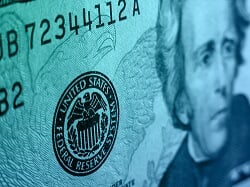 The long-awaited December Fed rate hike finally happened - so what will it mean for stocks?
The long-awaited December Fed rate hike finally happened - so what will it mean for stocks?
You'll hear a lot of talk today about how raising interest rates will have a negative impact on companies. It will hurt those that borrowed a lot of money when interest rates were near 0% - as they are today.
Since the Great Recession, companies mostly invested this borrowed money in financial assets like stocks and bonds. This wasn't what the Fed wanted. It wanted companies to use that money to invest in growth and pay employees more, so consumers have more money. But the economy wasn't growing much, so companies propped up the stock and bond markets instead, according to Money Morning Capital Wave Strategist Shah Gilani.
"Corporations have leveraged themselves up with cheap borrowing to buy back their shares to lift their stock prices and their earnings per share metrics," Gilani said.
When interest rates rise, companies saddled with debt will have to pay more interest on their loans. This shows up on earnings reports and looks bad for those companies' stocks.
Another factor to consider: Higher interest rates cause the U.S. dollar to appreciate. This can depress multinational corporations' overseas earnings, which also leaves a nasty mark on earnings reports.
Fortunately, the December Fed rate hike is going to have a much more mild effect on stocks than the doomsayers would have you believe.
And it's easy to see why...
Why the December Fed Rate Hike Won't Kill Stocks
The Fed didn't increase interest rates by much. It raised the federal funds rate by a quarter of a percentage point (0.25%). The Fed's goal is to bring U.S. monetary policy back to "normalization," a strategy to remove its monetary policy accommodations slowly over time.
It will take a long time for the monetary policy to reach normalization, especially at the timid pace the Fed wants to remove its keys from the engine. This won't likely prompt a huge stock sell-off.
In truth, however, no one knows exactly how an interest rate hike - even a small one - will affect markets.
The good news is, there are steps investors can take right now if the markets fall in the next month after the December Fed rate hike.
Tweet the author @cgsaucier, or leave a comment on Money Morning's Facebook page.
[mmpazkzone name="in-story" network="9794" site="307044" id="137008" type="4"]
Capital Controls Are Here: If you think you can always get cash out of your bank account when you want it, you're wrong. Banks can restrict access to deposits - or confiscate them - and yet the general public has no idea these "laws" exist. Here's how this nightmare could impact you...


